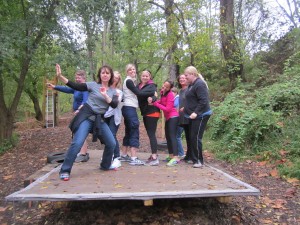 When it comes to building a successful business, Team Building can be a powerful tool. The American Psychological Association (APA) finds that team building activities can help employees feel valued, thus increasing motivation and overall productivity1 . Simply put, team building works, which is why it is “one of the most commonly applied group development interventions in organizations today,” according to University of Central Florida researchers Deborah Diazgranados, Cameron Klein, Eduardo Salas, Huy Le, C. Burke, Rebecca Lyons, and Gerald Goodwin2. Team building works by facilitating activities that encourage participants to examine, diagnose, and act upon their behavior and interpersonal relationships.3 However, team building is not a one-and-done experience. It is a process that requires reinforcement. Researchers Jacqueline M. Omuya, David M. Kungu, Leonard S. Mulongo, and Dedan O. Ong’anya recommend that “all employees should be trained to ensure they understand and concur on the benefits of team building.4” These follow-up sessions are proven to “help to sustain high performance.5”
When it comes to building a successful business, Team Building can be a powerful tool. The American Psychological Association (APA) finds that team building activities can help employees feel valued, thus increasing motivation and overall productivity1 . Simply put, team building works, which is why it is “one of the most commonly applied group development interventions in organizations today,” according to University of Central Florida researchers Deborah Diazgranados, Cameron Klein, Eduardo Salas, Huy Le, C. Burke, Rebecca Lyons, and Gerald Goodwin2. Team building works by facilitating activities that encourage participants to examine, diagnose, and act upon their behavior and interpersonal relationships.3 However, team building is not a one-and-done experience. It is a process that requires reinforcement. Researchers Jacqueline M. Omuya, David M. Kungu, Leonard S. Mulongo, and Dedan O. Ong’anya recommend that “all employees should be trained to ensure they understand and concur on the benefits of team building.4” These follow-up sessions are proven to “help to sustain high performance.5”
Researchers Agree That Team Building Requires Follow-Up
Researcher R. Wayne Boss writes that “When team building is coupled with follow-up sessions in which team building commitments are reinforced and renewed, the positive effects of the team building are prolonged.6”
“Research involving thousands of participants has shown how focused feedback and follow-up can increase leadership and customer service effectiveness,” say researchers Marshall Goldsmith and Howard Morgan.7 “It will require that team members have the courage to regularly ask for feedback and the discipline to develop a behavioral change strategy, to follow-up, and to ‘stick with it.’” Now this can be done in one of two ways:
- Groups can try on their own to reinforce the lessons learned during their team building experience.
- Groups can make team building a regular part of their business plan. Terrapin Adventures recommends a follow-up session every three to six months.
According to Omuya et al., “team building activities should be designed, planned, executed and monitored so as to create synergy, increase skills and knowledge, create organizational flexibility, provide members satisfaction and allow members freedom to participate in decision making and implanting changes.” This means trusting your group to a professional team building facilitator, like the ones found at Terrapin Adventures.
We are conveniently located between Baltimore and Washington DC and specialize in creating customized corporate team building programs designed to meet the unique needs of organizations, like yours. Our experienced staff is able to design a program – onsite or offsite, indoor or outdoor –to help your group increase their ability to problem solve, think creatively and collaborate with one another.
Schedule Corporate Team Building Activities!
If you have any questions, please call Terrapin Adventure at 301.725.1313, or email us at info@terrapinadventures.com to learn more.
Works Cited
- “APA Survey Finds Feeling Valued at Work Linked to Well-Being and Performance.”
- Diazgranados, Deborah, Cameron Klein, Eduardo Salas, Huy Le, C. Burke, Rebecca Lyons, and Gerald Goodwin. “Does Team Building Work?”
- Schein, Edgar H. “The Role of Process Consultation in the Creation and Implementation of Strategy.”
- Omuya, Jacqueline M., David M. Kungu, Leonard S. Mulongo, and Dedan O. Ong’anya. “Effects of Team Building on the Performance of Employees in Organizations towards the Realization of Millennium Development Goals: A Survey of Selected Banks in Eldoret Town.”International Journal of Current Research. Web.
- Dyer, William G., W. Gibb Dyer, and Jeffrey H. Dyer. Team Building: Proven Strategies for Improving Team Performance. San Francisco: Jossey-Bass, 2007. Print.
- Boss, R. W. “Team Building and the Problem of Regression: The Personal Management Interview as an Intervention.” The Journal of Applied Behavioral Science 19.1 (1983): 67-83. Web.
- Goldsmith, Marshall and Howard Morgan. “Team Building without Time Wasting.”
